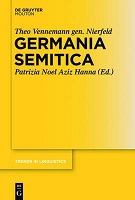Germania Semitica
Contributor(s)
Vennemann gen. Nierfeld, Theo (editor)
Noel Aziz, Hanna (editor)
Collection
Knowledge Unlatched (KU)Number
101064Language
EnglishAbstract
Germania Semitica explores prehistoric language contact in general, and attempts to identify the languages involved in shaping Germanic in particular. The book deals with a topic outside the scope of other disciplines concerned with prehistory, such as archaeology and genetics, drawing its conclusions from the linguistic evidence alone, relying on language typology and areal probability. The data for reconstruction comes from Germanic syntax, phonology, etymology, religious loan names, and the writing system, more precisely from word order, syntactic constructions, word formation, irregularities in phonological form, lexical peculiarities, and the structure and rules of the Germanic runic alphabet. It is demonstrated that common descent is neither a necessary nor a sufficient condition for reconstruction. Instead, lexical and structural parallels between Germanic and Semitic languages are explored and interpreted in the framework of modern language contact theory.


 Download
Download